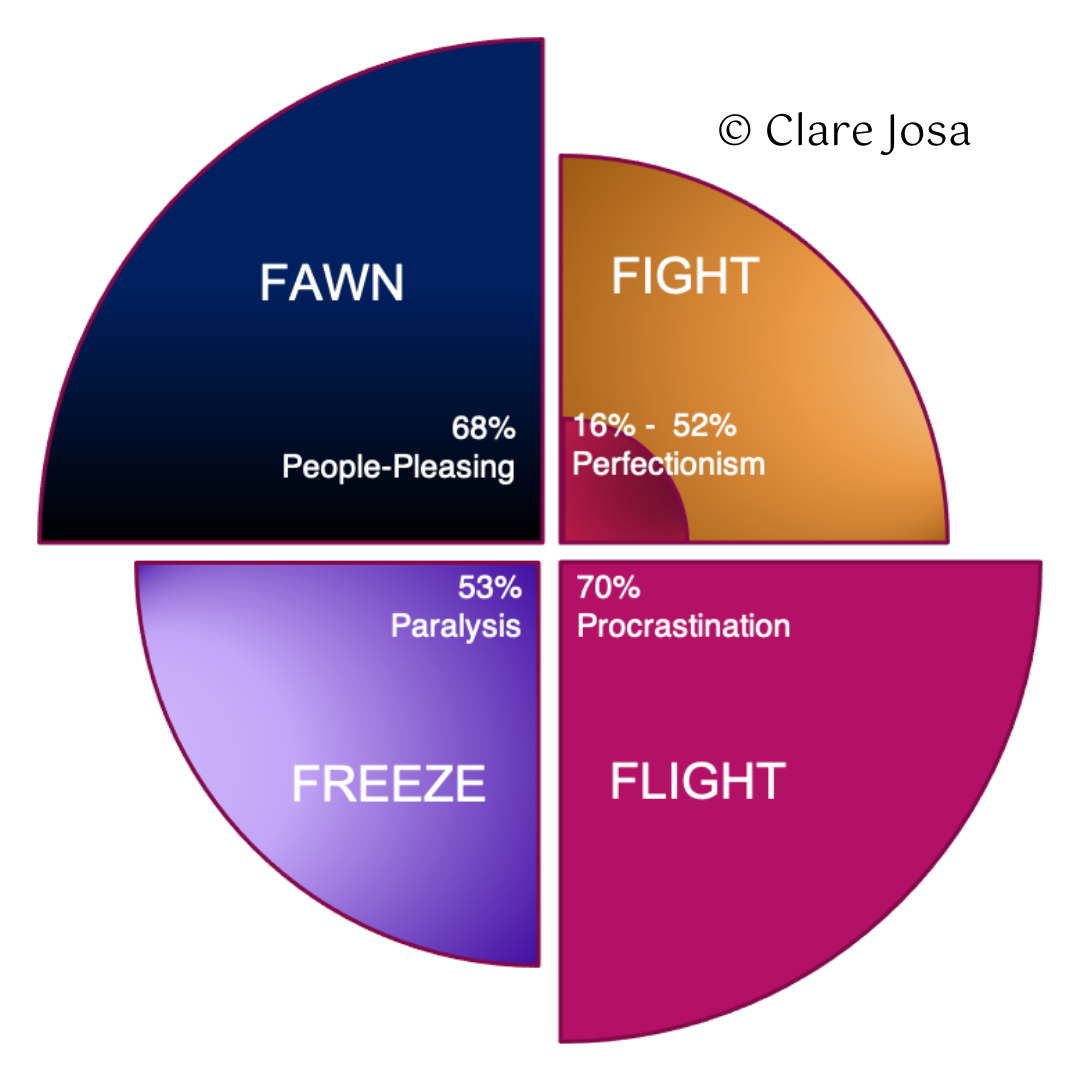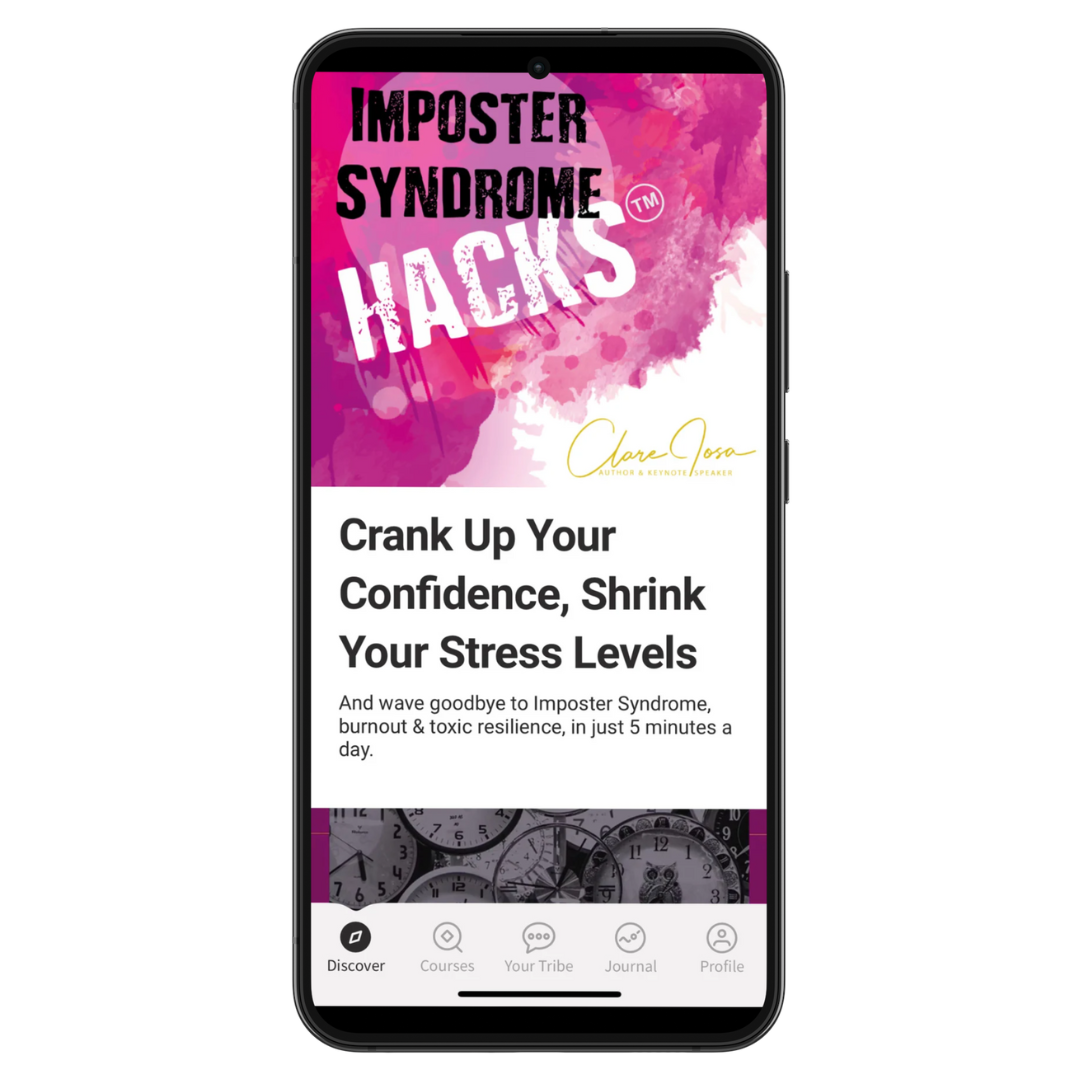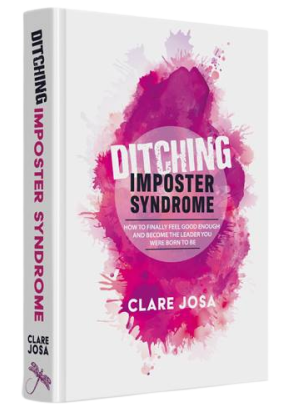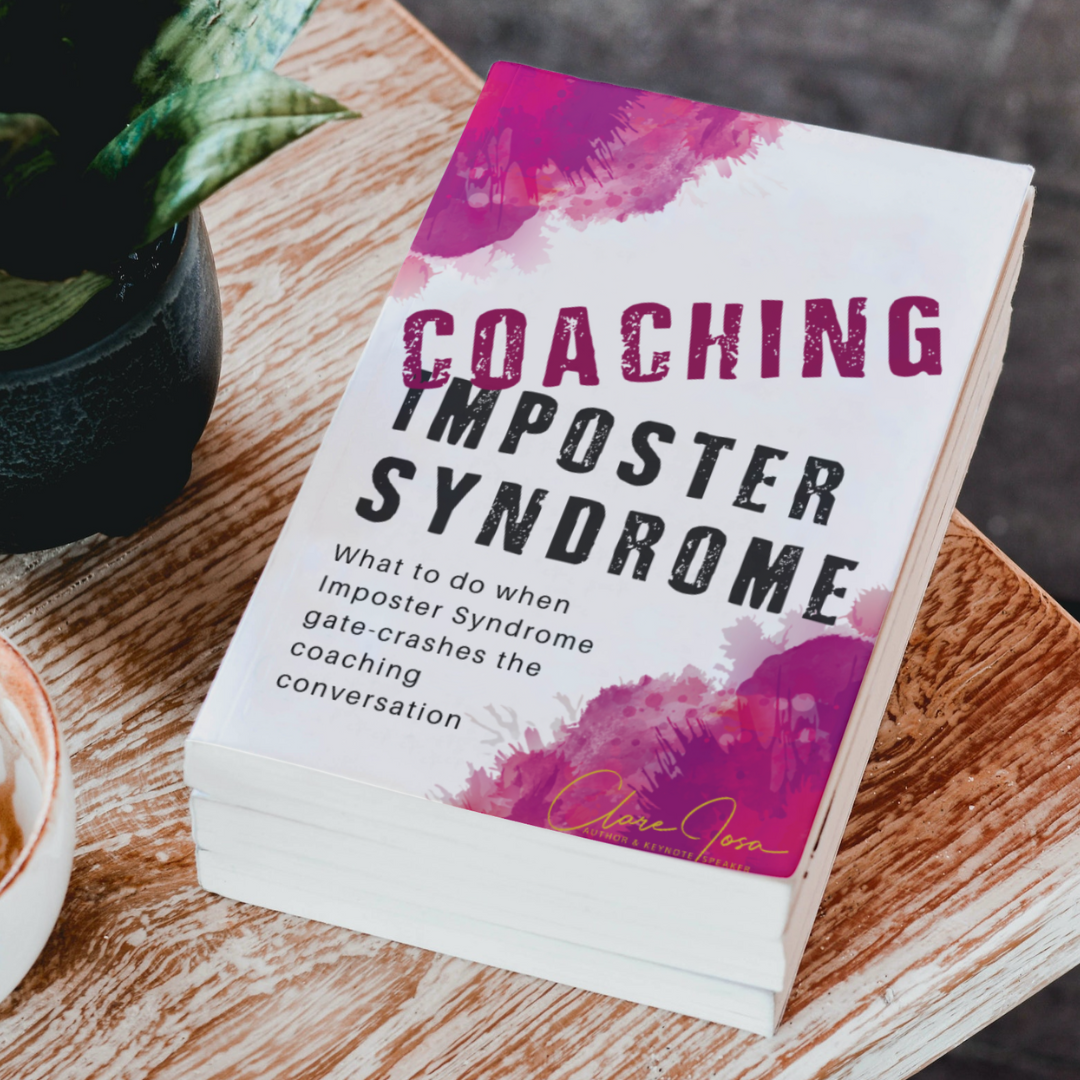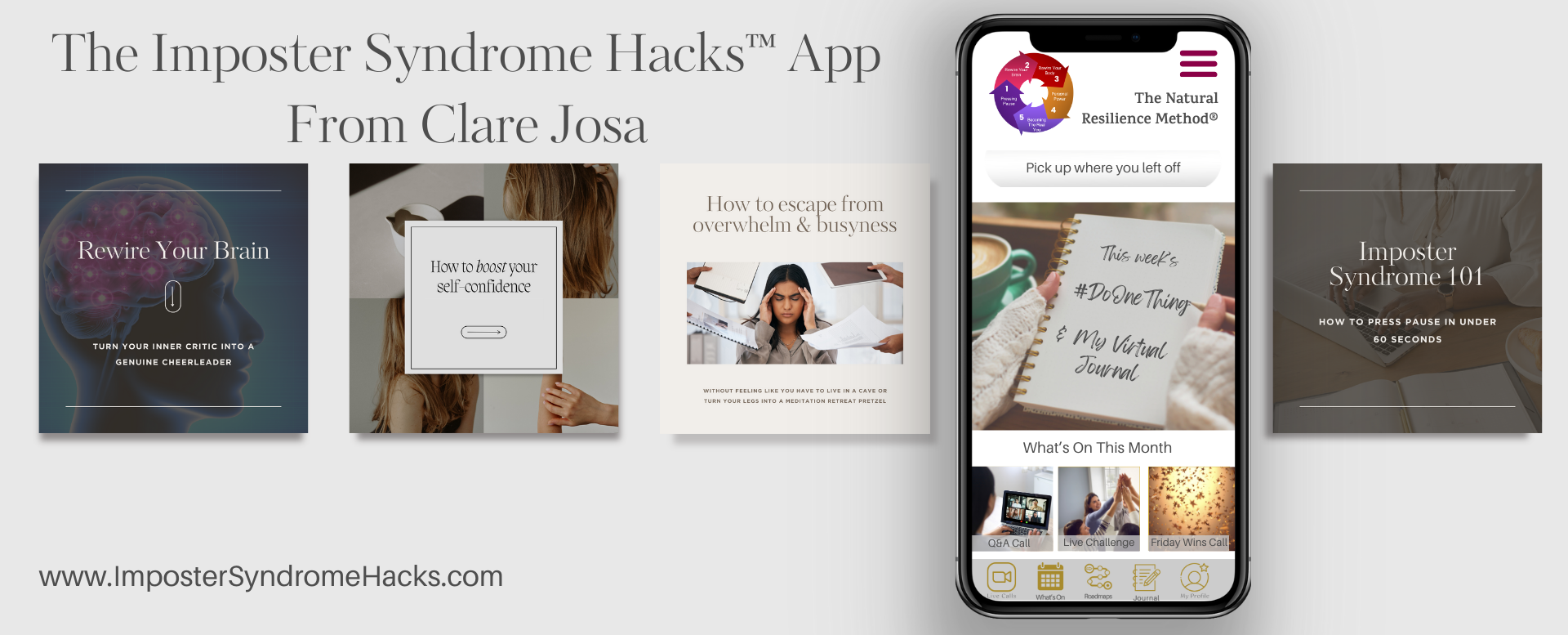Clare Josa's "4 Ps of Imposter Syndrome" are coping strategies that people use to handle Imposter Syndrome. They are four hidden warning signs that every leader, line manager and coach needs to know, so you can spot which of your team members or clients might be struggling.
As an Imposter Syndrome coaching model, it has been cited in numerous PhD and Masters Degree theses, and it is taught internationally on university MBA courses.
Clare's latest Imposter Syndrome Research Study (white paper here) shows that the 4 Ps of Imposter Syndrome are having a measurable negative impact on individuals, teams, and organisations, playing a key role in problems from burnout and performance issues, through to productivity problems and even staff retention.
Read on to explore this model in detail.

Sharing Policy For The 4 Ps Of Imposter Syndrome
Clare Josa is on a mission to free the world from Imposter Syndrome, so she encourages sharing the name and key aspects of the "4 Ps of Imposter Syndrome", to help others. Please follow these guidelines:
- No Verbatim Content: Do not share verbatim excerpts or graphics from this page without written consent, which you can request here.
- Attribution: When sharing, credit "Clare Josa, author of Ditching Imposter Syndrome" and link back to this page, with the clickable text: The 4 Ps of Imposter Syndrome
- Restrictions: Content may be used for personal or non-commercial purposes only, unless otherwise agreed. Sharing in free-to-view public articles, podcasts, videos, and social media posts is permitted, with proper attribution.
Thank you for wanting to make a positive difference in the world, whilst also respecting Clare Josa's intellectual property rights.
Thinking of quitting their job this week due to Imposter Syndrome. 1 in 10 each day.
'Very concerned' about burning out, due to Imposter Syndrome coping strategies
Imposter Syndrome is harming wellbeing, productivity & performance
Source © Clare Josa 2024 Imposter Syndrome Research Study
The 4 Ps Of Imposter Syndrome
In an ideal world, everyone would feel safe and supported to fulfil their potential. They'd be fully present whilst at work, proactive, productive and performing well. They'd have a good work-life balance. And they'd be spending most days thriving, instead of surviving.
Unfortunately, the 2024 Imposter Syndrome Research Study shows that about two thirds of your team members are struggling with Imposter Syndrome, daily or regularly, to an extent that's affecting their performance and their wellbeing. And one in ten of them will think of quitting - today - as a result. It's one in four each week.
One of the models that helps us to understand why this is came from Clare Josa's work that led to her 2019 Imposter Syndrome Research Study - the 4 Ps of Imposter Syndrome.
Imposter Syndrome is the secret fear of being found out as a fraud or not good enough, despite external-world evidence that you're doing well.
It's not the same as self-doubt or low confidence.
Self-doubt is about what we can or can't do.
Imposter Syndrome is about who we see ourselves as being. It's an identity-level issue, not mindset.
Clare Josa - Lead researcher
The 4 Ps Of Imposter Syndrome are:
These 4 Ps of Imposter Syndrome are coping strategies, driven by Imposter Syndrome, which people use so that they can succeed despite it, or simply to feel safe.
And they map onto the well-known fight-flight-freeze stress responses, as Clare will describe in detail, below.
A Tour Of The 4 Ps Of Imposter Syndrome
Productivity, performance and burnout issues are a hidden cost of Imposter Syndrome, driven in part by the 4 Ps coping strategies.
What you're looking for is changes in these 4 Ps behaviours, especially if it's multiple Ps changing at the same time. It's easy to imagine how they trash time management, performance, and productivity, as well as increasing stress levels.
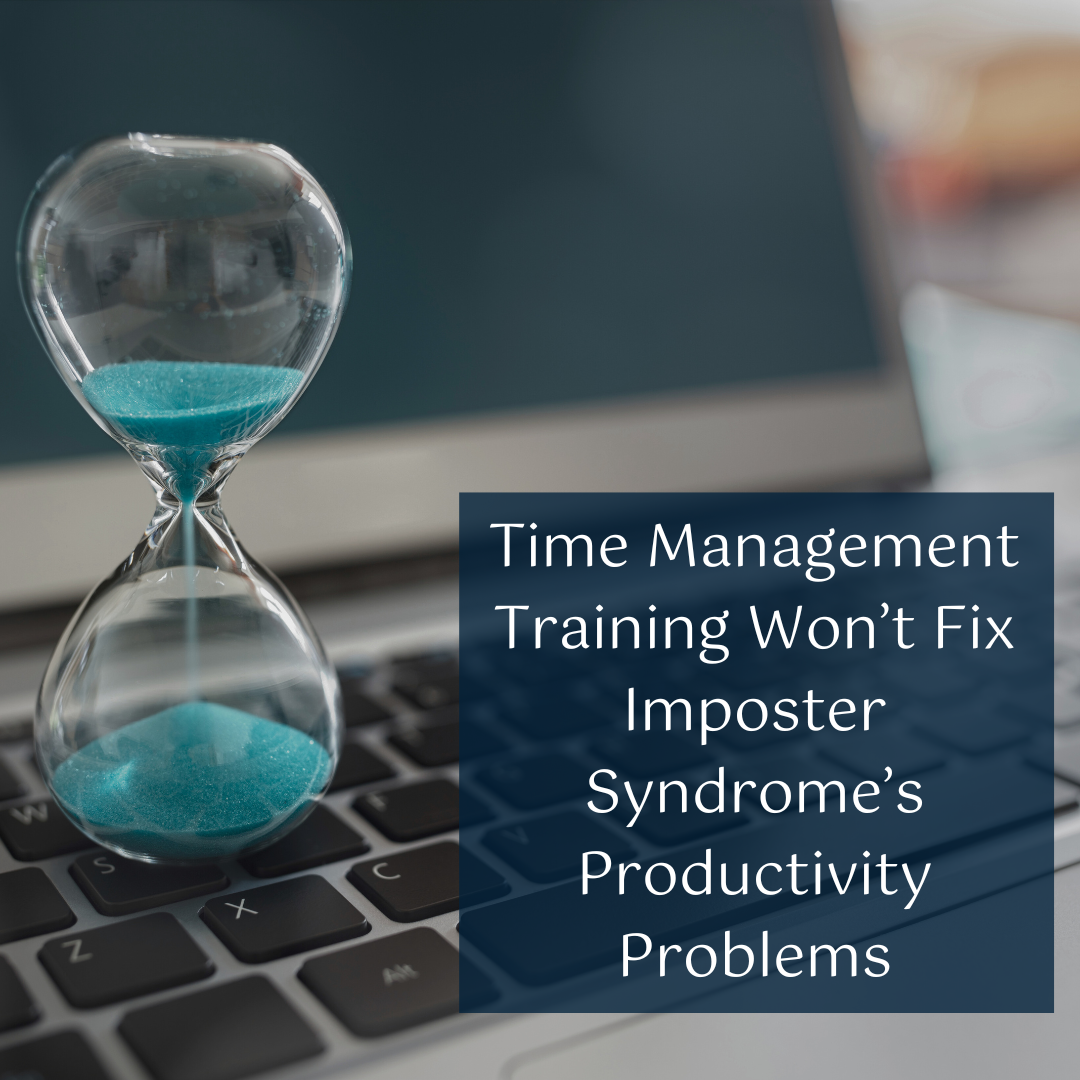
No amount of time management training or fancy time management apps is going to fix Imposter Syndrome, or prevent its negative impact on productivity for individuals and your organisation.
This is because the time-munching aspect of the 4 Ps of Imposter syndrome isn't about a lack of knowing how to prioritise. It's about a deeply subconscious fear of the consequences of taking that action, and our hard-wired need to feel safe.
The 4 Ps of Imposter Syndrome are run by the unconscious part of the brain, on autopilot. It implements them before the 'thinking mind' becomes aware of any perceived threat, meaning you're already self-sabotaging. The conscious brain is playing catch-up, desperately trying to plaster the time management techniques on top of the time-thieving coping strategies.
Throwing in apps and time management training to mask the problem also risks people forcing themselves to push on through the fear, which makes Imposter Syndrome worse, as explained here:
It's essential to move beyond guesswork and trial-and-error, to implement solutions that address the root causes of Imposter Syndrome, to fully prevent it, rather than just tinkering with the symptoms.
So what can you do?
What can you do about the harm caused by Imposter Syndrome-led Perfectionism, Procrastination, Project Paralysis and People-Please in your organisation?
Spot the signs. Stop the cycle.
Create lasting change.
Spotting The 4 Ps Of Imposter Syndrome
Here's a detailed exploration of the 4 Ps of Imposter Syndrome.
How many of these 4 Ps do you recognise in your colleagues? Or in yourself?
The great news is that they're not forever. They're just coping strategies, which you'll no longer need, once you've ditched Imposter Syndrome.
What happens when the 4 Ps of Imposter Syndrome combine?
This brings us into 'perfect storm' territory. They amplify each other. And they often bring in two of Imposter Syndrome's core emotions: guilt and shame.
Imagine some examples:
- Perfectionism plus procrastination leads to hours, days, and months of over-thinking and second-guessing for pretty much everything you do.
- Project paralysis and people-pleasing leads to massive guilt and beating yourself up for letting people down.
- People-pleasing plus procrastination risks you filling your time with 'busyness' activities to help others.
It's not uncommon for people to be relying on three or even all four of the Four Ps of Imposter Syndrome, to be able to cope.
When you clear Imposter Syndrome at the root cause level, the need for the 4 Ps as coping strategies disappear. And suddenly not only have you shifted from 'fighting' to 'flowing' in your work, but you regain hours of previously wasted time, each day.
The way to fix this is to clear Imposter Syndrome, not to apply yet more sticking plasters.
How Can You Prevent The 4 Ps From Harming Your Teams?
You need to move beyond sticking plasters and address the root causes of the Perfectionism, Procrastination, Project-Paralysis and People-Pleasing that are causing so much harm. Here's how you can do this:
Measure The Problem
How big is it?
Which key factors are driving it?
How much of it is down to individuals' habits, versus company culture or the working environment?
What are your quick wins vs strategic solutions?
How can you measure the ROI of any changes you make?
Prioritise Urgent Support
Who in your teams needs urgent support? Could you find them proven training or external certified Imposter Syndrome coaches?
How can you help them to self-identify, semi-anonymously, to avoid the embarrassment of having to ask their line manager? (Who will often be part of the cause)
Train Your Managers
With nearly two thirds of your team members struggling with Imposter Syndrome daily or regularly, all people leaders need training in how to spot this, and how to safely support people at the early intervention stage, without making things worse. In addition, managers need training in Imposter Syndrome-informed feedback and appraisals.
Clear Management Imposter Syndrome
Managers need to clear their own Imposter Syndrome first, if they're struggling with it, or it can be triggering and risk them keeping their team members stuck in coping strategies. Also, toxic managers are almost always driven by maladaptive Imposter Syndrome coping strategies and anxiety.
Train In-House Coaches
Don't want to be tied into expensive external coaches?
By training in-house experts in tools that help people to clear and prevent Imposter Syndrome, you can stop the majority of those thinking of quitting from doing so.
With the right support, it only takes 4-6 sessions to take Imposter Syndrome severity from 80% to 20%.
Make It Scalable
Not everyone needs 1:1 coaching, so make this work scalable by bringing in an app that is specially designed to support people in ditching Imposter Syndrome, in just 5 minutes a day.
Use the initial research study to identify who would most benefit from this.
Plus: Measure the results you're getting.
You can complete this process by using the initial research-backed assessment tool to check in again with your teams, putting data behind the transformations you've been creating.

Surely this is really expensive?
You could fully support a team of 250 for less than the cost of replacing a single team member who quits. And 25 of that team will consider quitting, today.
Struggling with staff retention, performance, productivity, and burnout is the expensive bit.
All of this is already waiting for you, and we can help you to start implementing these breakthroughs in improving the 4 Ps of Imposter Syndrome, in the next few weeks.
You'll be seeing results you can measure, in months, not years.
Here's how we can work together:
I'm Looking For Potential Solutions For My Organisation
If you're looking for a solution that's tailored to your organisation's needs, then let's talk.
You can book a no-obligation call with Clare Josa by completing a short questionnaire, which then takes you to her online diary, so you could get that called booked in now.
I Want Training So I Can Help Others
If you're looking to add science-backed, proven Imposter Syndrome strategies to your coaching toolkit, whether you're a line manager, HR professional, coach or consultant, Clare has certification programmes at two levels:
Imposter Syndrome Practitioner™
Imposter Syndrome Master Coach™
About Clare Josa.
Clare Josa is considered a global authority in Imposter Syndrome and burnout, having specialised in the fields since 2003.
She is the author of 10 books, including 2 on Imposter Syndrome: Ditching Imposter Syndrome and Coaching Imposter Syndrome, and has published 3 international research studies on the topic. She is a sought-after international keynote speaker and is regularly interviewed in the media and on podcasts.
Clare originally trained as a Masters Degree Mechanical Engineer, specialising in Six Sigma. She became Head of Market Research for one of the world's most disruptive brands, before setting up her own business in 2003. As a result, her inspirational work is grounded in research and science, with a generous dollop of demystified ancient wisdom.
She is the creator of the world's first Imposter Syndrome App - Imposter Syndrome Hacks™, which is designed to help you create breakthroughs in minutes, not months.
As featured in:

Clare Josa's Books Include:
What's The Next Step - For Your Organisation?

How Is Imposter Syndrome Affecting Your Organisation?
Clare Josa's research-backed, quiz-style assessment is a diagnostic tool that gives you insights into the hidden ways that Imposter Syndrome is affecting your teams, plus tailored suggestions for how you can best tackle it, based on your responses. In under ten minutes.
Plus when you have answered the questions, you'll get a link to Clare's diary, to book a call to explore the scalable solutions that would be the best fit for your team.
Want To Train With Clare Josa?
You don't have to want to rebrand as an Imposter Syndrome coach to gain huge benefit from Clare's Imposter Syndrome certification programmes.
They're great for coaches, consultants, line managers, HR professionals, Mental Health First-Aiders & more.
Find out more and apply:

